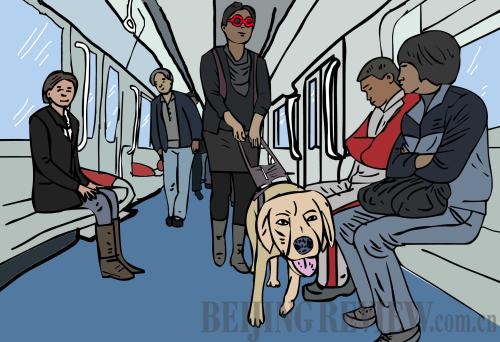|
 |
|
(LI SHIGONG) |
A new regulation of Beijing Municipality states that trained guide dogs will be allowed to take public transport in the city, compared to previous drafts that forbid any dogs from public transport. Many see it as a big step forward in improving the lives of disabled people living in cities. At the same time, it should not be denied that dogs are likely to spread diseases and could frighten children.
China is now home to around 17 million blind people. With the improvement of people's living conditions, more guide dogs are to be used. Thus, dealing with these dogs in terms of public transport is becoming an urgent problem and legal intervention is already unavoidable. The following are excerpts of opinions of the public:
Supporters
Sun Shuluan (Zhengzhou Evening News): Some people say that they are firmly against guide dogs' being allowed public transport, no matter what kind of dogs the guide ones are and whether or not they attack people. They argue that some people are naturally afraid of dogs, and thus, it's unacceptable to hurt the majority's interests for the sake of the minority.
However, why are the blind treated in this way? They've already endured hardships and mishaps. They need more warmth and care from society. The blind should be granted some privileges, one of which is the right to bring their guide dogs with them wherever they go in public. This is a widely-accepted practice around the world. It's unfortunate that in China, due to selfishness or indifference to the difficulties that disabled people face, some people show no respect for disability rights.
Lei Hongpei (Beijing Youth Daily): Guide dogs are effectively a walking stick for blind people, and more than that, these dogs are an important part of disabled people's life, ensuring their safety.
As for whether guide dogs should be allowed onto public transport: even if these dogs are likely to attack other passengers and may spread diseases or pose a threat to public security, they should be allowed to take public transport so long as they are vaccinated and wear mouth guards. Measures such as these can prevent incidents, so that these dogs' owners may enjoy a more convenient public life. That is why it is required in Beijing that guide dogs must be "trained and qualified." When this preparation work is done, allowing guide dogs onto public transport will make it much easier for the blind to travel around and other passengers will also feel more at ease when on the bus with such dogs. Thus, a balance is reached between blind people and the rest of the society.
Guide dogs deserve respect. They are mild in nature and will never attack others unless their owners are endangered. For a dog to be selected as a guide dog, there should be no record of attacking human beings or other dogs within seven generations. A qualified guide dog will "graduate" from school only after very strict training. To date, there is not even a single record of guide dogs attacking human beings.
Economic growth and social progress should also include more considerate care for social members with disabilities. Beijing's permission to take guide dogs on public transport is a good example of this progress.
Zhang Shaoting (voc.com.cn): The embarrassment facing guide dogs mainly results from people's misunderstanding of these dogs. It's therefore suggested that the media should do more to enhance people's understanding of guide dogs. When more and more people begin to understand that guide dogs are not ordinary pets, but have received special training of 18 months for the purpose of guiding their blind masters, it will be much easier for blind people to take these dogs out into public places. Before most people understand the merits of guide dogs, it's also necessary for authoritative departments to offer special certificates that can be hung on these dogs' backs, so that people know the dogs are safe and have been vaccinated as well as having gone through special training.
| 